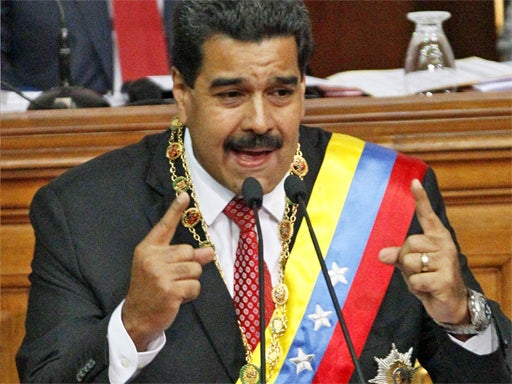President Nicolas Maduro seeks to rule Venezuela by decree
The successor to Hugo Chavez blames US ‘sabotage’ as corruption soars and economy slips towards chaos

Political tensions are back to near boiling point in Venezuela as the National Assembly in Caracas began debating a request by President Nicolas Maduro for emergency powers to restore order to a chaotic economy and tackle corruption.
“The government would have to come in with tanks and rifles if they want to apply this enabling law,” said Henrique Capriles, the opposition leader and Miranda state governor. “This law that he wants is in order to distract the people from their problems. Decree powers will not help the government be successful.”
The Assembly has five days to debate the request, which must be approved by a three-fifths majority. The ruling coalition is one vote short of that threshold and Mr Capriles is asking that the opposition hold firm. “Maduro and his gang will be remembered as presiding over the most corrupt period in the history of Venezuela,” Mr Capriles said.
Mr Maduro, the chosen successor to Hugo Chavez, who died from an undisclosed form of cancer in March, narrowly beat Mr Capriles in elections in April and vowed to continue his mentor’s socialist revolution. However, economic conditions have deteriorated, with the official inflation rate now exceeding 45 per cent and basic goods – from toilet paper to communion wine – frequently running out.
Nor has there been any improvement in ties with the US, as some had hoped after the passing of Mr Chavez. Mr Maduro recently expelled America’s top envoy, howling “Yankees go home!” in a televised speech and “Out of Venezuela!”
When 1.3 tonnes of cocaine were recently found on an Air France jet from Caracas to Paris he contended it was an American-led conspiracy.
Addressing Congress to repeated interruptions from supporters, Mr Maduro, a one-time bus driver, asserted his need for special powers for 12 months to crack down on corruption and accused Venezuela’s private sector of undermining his government. “Not a single day in these last five months has there been a reprieve, so that this administration can govern successfully,” he said. “Enough of the sabotage.”
Venezuela, the most oil-rich country in the world, emerged from the Chavez era almost split over his legacy. But after beating Mr Capriles by a sliver, Mr Maduro has increasingly been mocked by his critics as a shadow of the man he replaced. Ordinary Venezuelans, meanwhile, have been beset by economic disruptions, including shortages of food basics and ever more frequent power cuts.
Last month, Mr Maduro sent the army into a toilet paper production plant and said supermarket shelves were empty because Venezuelans eat too much. Meanwhile, the country suffers the highest murder rate of any Latin American country. If he is granted special powers, Mr Maduro may begin by modifying strict currency controls that have led to an exploding black market in American dollars.
When a transmission line failure on 3 September left 60 per cent of Venezuelans in the dark, Mr Maduro blamed Washington. “The government doesn’t want to assume any responsibility for the economic performance,” Asdrubal Oliveros of the Caracas-based research group Ecoanalitica told Bloomberg. “The enabling law will give them legal backing for their claim that they are in an economic war started by the private sector.”
President Maduro himself has said he faces difficulties not unlike those experienced by Mr Chavez in 2002 and 2003, when there was an attempted coup and an oil sector strike. He said he would root out corruption, even within his own party. “We’re going to fight capitalism even if it’s dressed in the reddest of reds,” he said. “We do it here and now or corruption is going to swallow the country.”
That corruption is rife is not contested; the country was placed 165th out of 174 nations in Transparency International’s most recent ranking of corrupt nations. Meanwhile, the currency controls instigated by Chavez have created a black market in which scarce dollars sell on backstreets at about seven times the official rate.
The huge discrepancy has spurred wealthier Venezuelans to travel abroad so that they can buy greenbacks with credit cards and return home to reap the easy profits.
Subscribe to Independent Premium to bookmark this article
Want to bookmark your favourite articles and stories to read or reference later? Start your Independent Premium subscription today.

Join our commenting forum
Join thought-provoking conversations, follow other Independent readers and see their replies